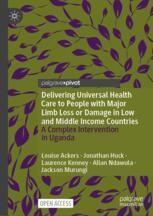Balancing the Goals of International Development with the Principles of Inclusivity, Sustainability and Economic Growth: Supporting Evidence-based Rehabilitation Services in Uganda
Published in Social Sciences, Sustainability, and Public Health
The complex wording of SDG16 infers a comfortable alignment of commitments to inclusivity, universality, sustainability and economic growth. The concept of inclusivity itself conflates wider goals of ‘levelling-up’ through ‘international development’ with more specific commitments to individual justice and self-actualisation. Rather than cozy bedfellows, these goals often stand in marked tension.
In 2019 the World Health Organisation launched its ‘Rehabilitation 2030 Call for Action’. This represented an important symbolic move away from a global health agenda shaped by an overly medicalised (treatment) agenda to embrace rehabilitation.
Stimulated by the Call for Action the Ugandan Ministry of Health commenced development of the first National Rehabilitation and Assistive Technology Strategic Plan and identified the urgent need for robust evidence to support this process.
Our book ‘Delivering Universal Health Care to People with Major Limb Loss or Damage in Low and Middle Income Countries; A Complex Intervention in Uganda’ https://link.springer.com/book/9783031854224 makes an important contribution to this process.
Our first goal in publishing a monograph based on 7 years’ Complex Intervention research was to capture, as holistically as possible, the service landscape and experiences of users and health professionals in an area of health care entirely moulded by and dependent upon Overseas Development Assistance (ODA). The book documents a number of key challenges facing rehabilitation services:
- The prioritisation of conflict injury in the distribution of and access to services lies in tension with the commitment to the delivery of universal health coverage.
- Insulated from the challenges of engaging with government and the associated corruption and bureaucracy, ODA actors have favoured investment in the Private-not-for-Profit (PNFP) sector contributing to poor service coordination, duplication and patchy and inequitable access. Some services are only available to conflict cases or refugees, for example, and typically distinguish prosthetics from orthotics and lower limb from upper.
- The tendency of ODA funders to ‘donate’ materials, often whole limbs, typically without consultation with Ugandan technologists has contributed to poor quality service delivery models and device abandonment. This has also marginalised a highly skilled and innovative workforce.
- Endemic corruption across all sectors, often stimulated by ODA ‘opportunity’ has escalated service costs and prohibitive charging.
- In the absence of any public funding for rehabilitation materials the reliance on ODA has stifled supply chains, future manufacturing capacity and the potential for economic growth.
Our research has underlined the urgent need for affordable and accessible services to meet the more distributed and fast-growing population of amputees arising from road traffic accidents, inter-personal violence (including domestic violence) and non-communicable disease (notably diabetes).
The second goal was to develop and evaluate a Complex Intervention co-designed to demonstrate the ability to sustainably deliver high quality, free public services to all users. Local technologists and users were actively engaged in the choice of technologies and materials. Built on social enterprise principles, it does not rely on any financial ‘donations’ and has taken important steps forward to build international supply chains in materials and devices significantly reducing the cost of prosthetic and orthotic manufacture. In that respect the work has shown the potential to harness existing partnerships and investments in ways that optimise pathways to economic growth and longer term health system change.
The Palgrave PIVOT series offers an opportunity for researchers to communicate complex concepts to diverse, multi professional, audiences and particularly policy makers. Open Access is critical in this regard especially in LMIC setting. The ability to download individual chapters offers busy people a more palatable ‘way-in’. We have combined our Palgrave PIVOT publications with dedicated Policy Reports prepared specifically for policy makers and bespoke events involving health workers and users in local communities to optimise ‘reach’ and advocacy potential.
Achieving societal change, as envisioned in SDG16, is never a simple or linear process. And creating an evidence-base rarely, in itself, stimulates change. This is particularly true where endemic corruption has created powerful vested interest in maintaining the status quo. Certainly large volumes of ODA are diverted into the pockets and vehicles of key stakeholders under the guise of ‘meetings’, ‘outreach activities’ and ‘trainings’ widening the gap between the ‘haves’ and the ‘have-nots’ in Ugandan society.
As the shock waves stimulated by the instant withdrawal of USAid and the subsequent withdrawal of UK, Dutch and other sources dissipate and the impacts emerge we might take time to consider how best to support the global commitment to health partnership enshrined in SDG17. Echoing the key messages of our previous publications there is an urgent need to ensure that we take account of damaging externality effects that contribute to Aid-malignancy Mobile Professional Voluntarism and International Development: Killing Me Softly? | SpringerLink and ‘First Do No Harm’ - The Ethics of Educational Healthcare Placements in Low and Middle Income Countries: First Do No Harm? (2017 - Open Access) .
Follow the Topic
What are SDG Topics?
An introduction to Sustainable Development Goals (SDGs) Topics and their role in highlighting sustainable development research.
Continue reading announcement
Please sign in or register for FREE
If you are a registered user on Research Communities by Springer Nature, please sign in